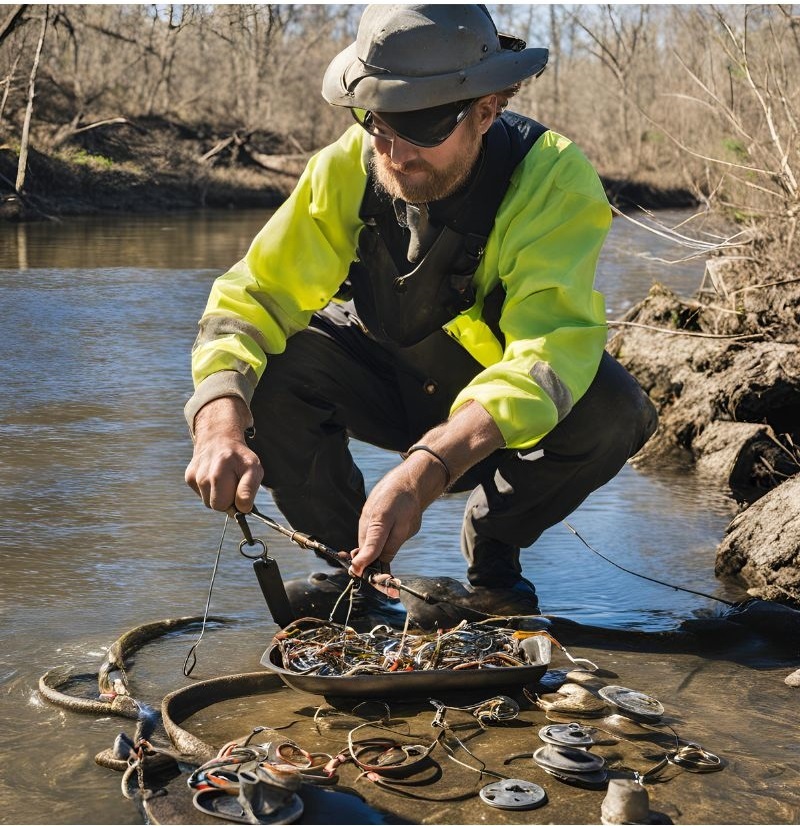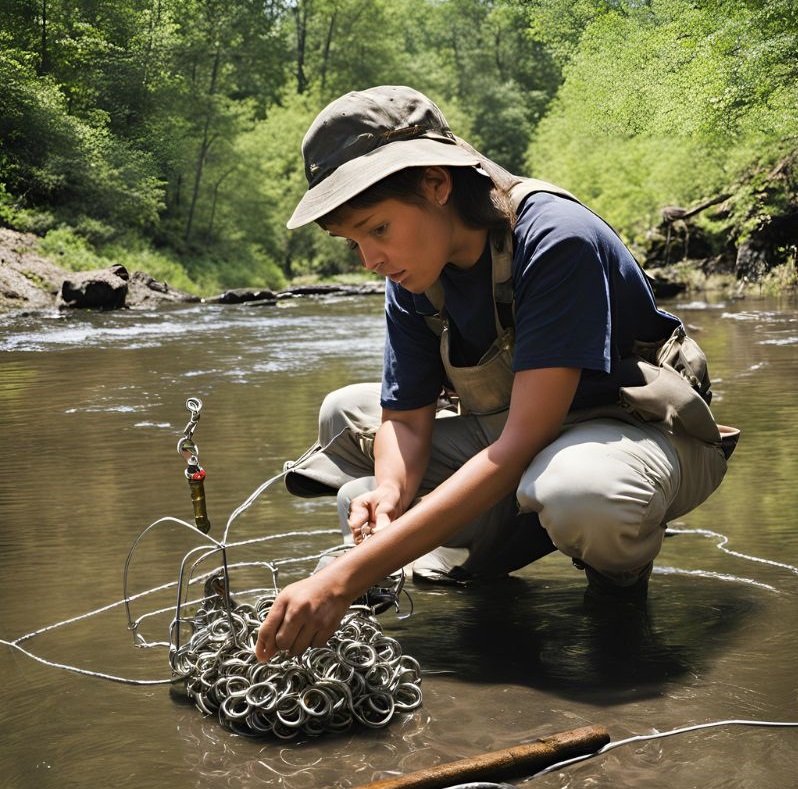What is Magnet Fishing?
Magnet fishing is a thrilling hobby that’s a blend of treasure hunting and environmental cleanup. Enthusiasts use powerful magnets to pull metal objects from rivers, lakes and canals, embarking on a quest to find lost relics, valuables or even weapons. By attaching a strong magnet to a rope and casting it into the water, magnet fishermen unearth a variety of metal objects, from old tools to historical artifacts, adding an element of adventure to their outdoor activities.
How did Magnet Fishing become popular?
Magnet fishing became popular through social media where people share their finds, from old weapons to pieces of history. As the activity grew, so did the awareness of the downsides, and now some areas have restrictions.
Why is Magnet Fishing bad for the Environment?
Despite the fun, magnet fishing has some unintended consequences:
- Disruption to Waterways: Pulling out large metal objects can disrupt aquatic life and disturb plant and animal habitats.
- Release of Pollutants: Rusted or corroded metal objects can release toxins and contaminants when disturbed, affecting water quality.
- Unexploded Ordnance: In areas with a military history there’s a risk of finding explosive devices, which can be dangerous for the magnet fisher and the environment.
These are the main reasons many places restrict magnet fishing to protect historical sites and natural habitats.

Why do some states restrict or ban magnet fishing?
- Preservation of Historical Artefacts: Many waterways have important artifacts to a region’s history. Magnet fishing can remove or damage relics before archaeologists document or preserve them.
- Safety: The risk of pulling up live ammunition or explosives, especially in Europe or areas with a military history, is high.
- Environmental: Disturbing some water bodies can harm fragile ecosystems and degrade natural habitats.
Areas in the U.S. where Magnet Fishing is restricted or illegal
- Most U.S. states don’t have a statewide ban but some cities and areas have restrictions for safety and environmental reasons. Here’s a list: South Carolina:
- In Charleston, magnet fishing is not allowed around historical sites, especially those related to the Civil War. Removing artifacts from these waters can destroy historical data.
- Washington D.C :
- Potomac and Anacostia Rivers have restrictions due to historical preservation laws. The National Park Service does not recommend Magnet fishing in these areas because it can disturb submerged cultural resources.
- Florida:
- St. Augustine doesn’t allow magnet fishing near its historical areas to protect artifacts in this 16th century city.
- Parts of the St. Johns River also do not allow magnet fishing because of archaeological sites and artifacts.
- Michigan:
- In Detroit, magnet fishing in the Detroit River is not allowed to protect historical trade and military artifacts. The river is historic, and removing items can damage the area’s cultural resources.
- Minnesota:
- Certain areas near Fort Snelling and parts of the Mississippi River are restricted because of military artifacts and historical items related to early American history.
- California:
- San Francisco Bay and surrounding areas have restrictions to protect the environment and avoid hazardous waste.
- Pennsylvania:
- Philadelphia has restrictions near the Delaware River and historical sites to protect submerged artifacts from the colonial era.
- New York:
- Parts of the Hudson River near historical sites don’t allow magnet fishing because of artifacts from historical battles and settlements.
Tip: Check local and state laws before magnet fishing to avoid trouble. Some areas, especially historical and protected waters, have strict rules or no-go zones.
Magnet Fishing Safety
To be safe and legal, follow these:
- Research Local Laws: Check if magnet fishing is allowed in that area.
- Leave-No-Trace: Take pictures of finds in historical areas and report notable finds to local authorities.
- Wear Gloves and Safety Gear: Magnet fishing can expose you to sharp, rusty objects so wear gloves and long sleeves.
What will you find?
Here’s what you’ll find:
- Tools and Hand Equipment: Wrenches, hammers and pliers near docks and bridges.
- Scrap Metal: Old bikes, scrap iron and metal signs.
- Historical Artifacts: With permits, you may find historic coins, weapons, or relics in certain areas.
- Fishing Gear: Lost hooks, lures and rods in fishing spots.
| Item Type | Likely Locations | Environmental Impact |
| Tools | Docks, bridges, and riversides | Minimal but can release rust into water |
| Scrap Metal | Urban rivers, canals | High; can leach contaminants if broken |
| Historical Artifacts | Old cities and battlefields | Potential cultural loss if not reported |
| Fishing Gear | Lakes and popular fishing spots | Minimal but adds to metal pollution |
Magnet fishing kits
Here’s a list of magnet fishing kits available on the market for all levels of magnet fishermen:
- Wukong Magnet Fishing Kit
- Magnet Strength: 1,200 lbs (544 kg)
- Includes: High strength magnet, 65ft nylon rope, gloves, carabiner
- Features: Heavy duty performance and strong pull force, great for bigger metal objects.
- King Kong Magnetics Fishing Kit
- Magnet Strength: 800 lbs (362 kg)
- Includes: Powerful magnet, 100ft rope, gloves, thread locker, carry case
- Features: Medium to heavy objects and includes thread locker to prevent magnet from loosening.
- Brute Magnetics Magnet Fishing Kit
- Magnet Strength: 1,500 lbs (680 kg)
- Includes: Magnet with case, 65ft double braid rope, grappling hook, gloves, carabiner
- Features: Deep water use is highly durable with a strong magnet for heavy-duty use.
- Muscular Magnetics 1,200 lb Magnet Fishing Kit
- Magnet Strength: 1,200 lbs (544 kg)
- Includes: 2 sided magnet, 65ft rope, carabiner, thread locker, gloves, carry case
- Features: 2-sided magnet for more chances of retrieval for beginners and experienced users.
- Kratos Magnetics Titan 360° Magnet Fishing Kit
- Magnet Strength: 3,600 lbs (1,633 kg)
- Includes: 360° magnet, 100ft heavy duty rope, gloves, thread locker, carry case
- Features: 360° magnet maximizes surface area for more efficient pulls, for serious magnet fishers.
- Mutuactor Magnet Fishing Kit
- Magnet Strength: 600 lbs (272 kg)
- Includes: Strong magnet, 65ft nylon rope, thread locker, gloves, storage bag
- Features: Budget and compact, for beginners and lighter use.
- Rogue Magnetics Beast Fishing Kit
- Magnet Strength: 2,600 lbs (1,179 kg)
- Includes: Ultra strong magnet, 100ft rope, gloves, carabiner, case
- Features: Exceptional power for larger submerged objects for experienced users.
- Centurion Magnetics Complete Fishing Kit
- Magnet Strength: 1,000 lbs (454 kg)
- Includes: Strong magnet, 65ft rope, gloves, grappling hook, carabiner, carry bag
- Features: Balanced strength and affordability with grappling hook for tougher finds.
Comparison Table
| Brand | Magnet Strength | Rope Length | Includes | Ideal For |
| Wukong | 1,200 lbs | 65 feet | Magnet, rope, gloves, carabiner | Medium to heavy finds |
| King Kong Magnetics | 800 lbs | 100 feet | Magnet, rope, gloves, case | Versatile, beginner-friendly |
| Brute Magnetics | 1,500 lbs | 65 feet | Magnet, rope, gloves, hook | Deep-water heavy-duty use |
| Muscular Magnetics | 1,200 lbs | 65 feet | Double-sided magnet, rope, gloves | Broad-range, efficient pulls |
| Kratos Magnetics Titan | 3,600 lbs | 100 feet | 360° magnet, rope, gloves, case | Professional, extensive use |
| Mutuactor | 600 lbs | 65 feet | Magnet, rope, gloves, bag | Beginners, lighter items |
| Rogue Magnetics Beast | 2,600 lbs | 100 feet | Magnet, rope, gloves, case | Serious, high-strength needs |
| Centurion Magnetics | 1,000 lbs | 65 feet | Magnet, rope, gloves, hook | Balanced power and affordability |
Magnet Fishing Kit Tips
- Magnet Strength: Choose based on what you want to pull. For heavy objects look for 1,200 lbs or more.
- Kit Complete: For convenience choose a complete kit with rope, gloves and case.
- Rope Length and Quality: Longer, thicker ropes (at least 65 feet) for deeper fishing.
- Extras: Some kits come with thread locker and grappling hooks for securing the magnet and tackling tougher finds.
Magnet Fishing FAQs
Is Magnet Fishing Legal in the U.S.?
Magnet fishing is legal in most states but may be restricted near historical sites, protected areas and military zones. Always check local laws before magnet fishing.
Why Are Some Places Restricting Magnet Fishing?
Restrictions are due to environmental disruption, safety risks from unexploded ordnance and loss of historical artifacts.
Can Magnet Fishing Harm the Environment?
Yes it can. Magnet fishing can release pollutants from disturbed metals, disrupt habitats and affect water quality. Dispose of your finds responsibly.
Do I Need a Permit for Magnet Fishing?
In areas with historical or environmental protections you may need a permit. Always check with local authorities.
What to Do if You Find an Explosive Device While Magnet Fishing?
Leave it in place and call local authorities immediately. Don’t try to remove or handle it yourself. It’s very dangerous.
Conclusion
Magnet fishing is a fun way to combine environmental cleanup with treasure hunting. But it comes with responsibilities. Knowing the laws and environmental impact of magnet fishing will help you enjoy the hobby safely and preserve historical artifacts and natural habitats. Always research local regulations, wear safety gear and respect restricted areas. Happy fishing!




